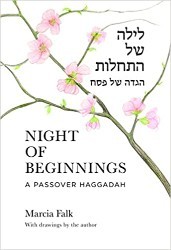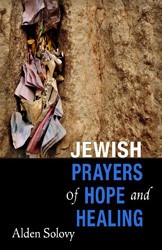Marcia Falk (The Book of Blessings, The Song of Songs: Love Lyrics from the Bible) provides readers with a deeply spiritual and aesthetically pleasing experience in her new guidebook to the High Holy Days, written thanks to grants from The Hadassah-Brandeis Institute. Focusing on the concept of t’shuvah as “turning the heart” in the broadest sense — or as she says, “meeting oneself face-to-face, opening the heart to change” — Falk focuses attention not on God (a word she avoids using) but the High Holy Days, sacred in a personal way, and ways of rendering the world. Moving from spiritual preparations for Rosh Hashanah through the closing of the gates at the end of Yom Kippur, she offers poems of her own alongside Biblical verses to focus the reader at each step of the process.
Her themes are threefold. First is Shofarot (Calls), awakening the self and genuinely hearing others, followed by Zikhronot (Recalling) of memories and relationships. Last is Malkhuyot (Callings), a reaffirmation of sacred values, grounded in the Shema. “Hear, O Israel — /The divine abounds everywhere/and dwells in everything/Its faces are infinite/Its source suffuses all/The many are one.”
Every section of The Days Between contains glimmers of true wisdom. In her poem “Enduring,” Falk writes of Yizkor: “Time, though imperfect/is diligent, and wrestles down grief./and…all things are born small/and grow large – /except grief, which is born large/and grows small.” In “Another View,” she beautifully evokes just how such diminution of grief begins: “Then you stop thinking of cold/and wonder where the day is going/and how much of yourself will go along.” In the section on Kol Nidre, Falk describes unkept promises as wounds that cannot heal without the balm of God’s absolution.
In her closing essay, Falk talks about the deeper meanings of words — such as the verb “to contemplate,” which she points out comes from the Latin “templum,” also the source of the word “temple.” Viewed this way, thoughts and sacred space are one, and it is our obligation as human beings to use the mind well and for the purposes intended by God, or the universe, or whatever power one feels to be at the root of things. Though this remarkable book is intended for use during the High Holy Days, its value as a guide for the soul extends throughout the year.
Related content:
- Internal Dialogue: The Days of Awe 5775
- Internal Dialogue: 10 Books for the 10 Days of Awe
- On Changes in Jewish Liturgy Options and Limitations by Daniel Sperber





